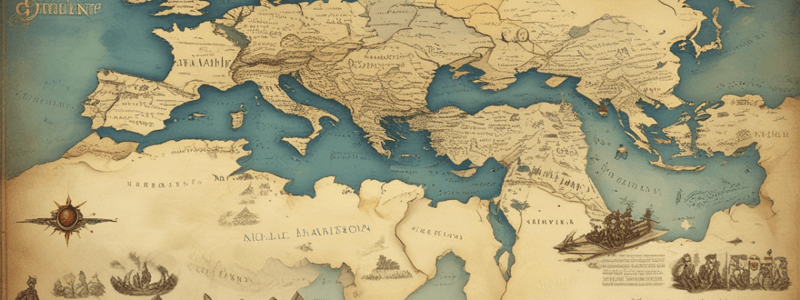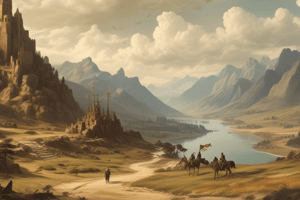Podcast
Questions and Answers
What was the key development in the Neolithic Revolution?
What was the key development in the Neolithic Revolution?
- Agriculture, settlements, and social hierarchies (correct)
- Industrialization and urbanization
- Rise of Christianity and the Catholic Church
- Development of stone tools
Which ancient civilization was located in the Tigris-Euphrates Valley?
Which ancient civilization was located in the Tigris-Euphrates Valley?
- Ancient Greece
- Ancient Egypt
- Ancient Rome
- Mesopotamia (correct)
What was the main outcome of the Fall of the Roman Empire?
What was the main outcome of the Fall of the Roman Empire?
- Development of feudalism (correct)
- End of the Crusades
- Rise of Christianity
- Beginning of the Renaissance
What was the main characteristic of the Enlightenment? change
What was the main characteristic of the Enlightenment? change
What was the main outcome of the Industrial Revolution?
What was the main outcome of the Industrial Revolution?
What is a major challenge facing the world today?
What is a major challenge facing the world today?
Flashcards are hidden until you start studying
Study Notes
Prehistory (Before 3000 BCE)
- Earliest human-like species: Homo habilis (2.8 million years ago)
- Development of stone tools and early societies
- Neolithic Revolution (10,000 years ago): agriculture, settlements, and social hierarchies
Ancient Civilizations (3000 BCE - 500 CE)
- Mesopotamia: Sumerians, Akkadians, Babylonians (Tigris-Euphrates Valley)
- Ancient Egypt: Pyramids, Pharaohs, Hieroglyphics (Nile Valley)
- Ancient Greece: City-states, Democracy, Philosophy (Athens, Sparta)
- Ancient Rome: Republic, Empire, Law, Architecture (Mediterranean)
Middle Ages (500 - 1500 CE)
- Fall of the Roman Empire (476 CE)
- Rise of Christianity and the Catholic Church
- Feudalism: Kingdoms, Nobility, Vassals, and Serfs
- Crusades: Christian-Muslim conflicts (1095-1291)
Early Modern Period (1500 - 1800 CE)
- Renaissance: Revival of classical learning and culture (Italy, 14th-17th centuries)
- Age of Exploration: European discovery and colonization (15th-17th centuries)
- Reformation: Protestantism and the split from the Catholic Church (16th century)
- Enlightenment: Reason, Science, and Democracy (17th-18th centuries)
Modern Period (1800 - 2000 CE)
- Industrial Revolution: Mass production, urbanization, and economic growth (18th-19th centuries)
- Nationalism: Rise of nation-states and identity (19th-20th centuries)
- Imperialism: European colonization and domination (19th-20th centuries)
- World Wars: Global conflicts (1914-1918, 1939-1945)
- Cold War: East-West rivalry and proxy wars (1945-1991)
Contemporary Period (2000 CE - present)
- Globalization: Economic integration, technology, and cultural exchange
- Rise of new powers: China, India, and the BRICS nations
- Challenges: Terrorism, climate change, and economic inequality
- Ongoing conflicts: Middle East, Africa, and Eastern Europe
Studying That Suits You
Use AI to generate personalized quizzes and flashcards to suit your learning preferences.




